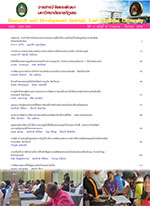การบริหารการเงินของวัดตามหลักธรรมาภิบาล ศึกษากรณีวัดในเขตอำเภอเมือง จังหวัดนนทบุรี
Keywords:
การบริหารการเงิน, วัดในเขตอำเภอเมืองนนทบุรี, จังหวัดนนทบุรี, financial management, temples in Mueang Nonthaburi district, Nonthaburi provinceAbstract
วัดเป็นองค์กรไม่แสวงหากำไรที่ดำเนินงานโดยไม่หวังผลกำไรมีความผูกพันกับ บุคคล ชุมชน และสังคม การบริหารการเงินของวัดตามหลักธรรมาภิบาล ซึ่งมีความสำคัญอย่างมากในปัจจุบัน โดยคนส่วนใหญ่ได้บริจาคเป็นเงินให้กับวัดเป็นเพราะมีความสะดวกและนำไปใช้ ในการพัฒนาในรูปแบบด้านต่างๆ ได้ใช้เพื่อทำนุบำรุงพระพุทธศาสนา ในหลายๆ ด้าน การนาเงินที่ได้รับจากการบริจาคนั้น ด้วยความสำคัญทางหลักการเงินของวัดนั้น เป็นสิ่งสำคัญโดยมุ่งเน้น 3 ด้าน ของหลักการเงินของวัด 1) ด้านจัดหารายได้ 2) ด้านการลงทุน 3) ด้านการใช้จ่าย โดยนำหลักธรรมาภิบาล มาใช้ในการบริหารจัดการ เพื่อให้เกิดหลักธรรมาภิบาลเกิดขึ้นโดยเป็นรูปธรรม ผู้บริหารการเงินของวัดนั้นจะต้องให้ความสำคัญอย่างมาก เพื่อให้หลักการเงินของวัดที่ดีสามารถส่งผลต่อการบริหารการเงินของวัดตามหลักธรรมาภิบาล ผู้บริหารการเงินสามารถพัฒนาหลักการเงินของวัดใน 3 ด้าน ให้มีประสิทธิภาพ การตรวจสอบการเงินของวัดมีความโปร่งใส และสามารถตรวจสอบได้ การศึกษานั้นผู้วิจัยมีวัตถุประสงค์ในการศึกษาครั้งนี้ 1) เพื่อทราบการบริหารการเงินของวัดในเขต อำเภอเมือง จังหวัดนนทบุรี 2) เพื่อทราบปัจจัยที่มีผลต่อการบริหารการเงินของวัดในเขต อำเภอเมือง จังหวัดนนทบุรี 3) เพื่อทราบปัญหาและอุปสรรคในการบริหารการเงินของวัดในเขต อำเภอเมือง จังหวัดนนทบุรีผลการศึกษา พบว่า หลักการเงินของวัด ด้านจัดหารายได้ ภาพรวมอยู่ในระดับน้อย มีรายได้จากกิจกรรมวันสำคัญทางพระพุทธศาสนา ด้านการลงทุน ภาพรวมอยู่ในระดับน้อย ส่วนใหญ่นาเงินไปใช้ในการก่อสร้างอาคาร และปฏิสังขรณ์วัดในด้านต่างๆ ด้านใช้จ่ายของวัด ภาพรวมอยู่ในระดับปานกลาง วัดส่วนใหญ่มีค่าใช้จ่าย ค่าสาธารณูปโภค เช่น ค่าน้ำ ค่าไฟ และ ค่าขยะ สะท้อนให้เห็นว่า ด้วยมีหลักการเงินของวัดส่งผลต่อด้านการบริหารการเงินตามหลัก ธรรมาภิบาลหรือการบริหารจัดการที่ดี อยู่ในระดับมาก โดยมุ่งเน้นในด้านความโปร่งใส หลักการบริหารการเงินของวัด อยู่ในระดับปานกลาง โดยพบว่า วัดที่มีการบันทึกรายรับ – รายจ่าย การเงินของวัด และด้านปัญหาและอุปสรรคที่เกิดขึ้นภายในวัดนั้น ส่วนใหญ่ยัง ขาดความรู้ในการบริหารการเงิน ผู้บริหารการเงินของวัดยัง ขาดผู้เชี่ยวชาญในการบริหารการเงินวัด วัดที่มีรายรับ – รายจ่ายของวัด ส่วนใหญ่ของวัด จะมีรูปแบบการดำเนินการที่ชัดเจน
Financial management of temple under good governance Case study: temple in Mueang district, Nonthaburi province
Temple is a non-profit organization which engages with people, community and society. The financial management of temple under good governance is very important nowadays. Most people donate money for temple because it is convenient and able to use in various forms to develop and to support the Buddhism. The use of donated money by emphasizing the financial principle is important and focusing on 3 areas of financial principle of temple; 1) the raising of income 2) investment and 3) expense by adopting the good governance principle in management to establish the good governance concretely. The temple financial manager shall emphasize strongly to allow the good financial principle to be applied with on the financial management under good governance principle. The financial manager can develop the temple’s finance in such 3 areas to be effective with clear validation of finance and to be audited. The objectives of research are to 1) understand the financial management of temple in Mueang Nonthaburi distrcit, Nonthaburi province 2) examine the factors influencing the financial management of temples in Mueang Nonthaburi distrcit, Nonthaburi province.
The results found that the area of raising income was totally in low level. The income was from the activitied on Buddhism days. The area of investment was totally in low level. The most investments involved with construction of building and renovation of temple. The area of expense was totally in intermediate level. The most expenses of temple were water and electricity bills and waste disposal charge. This reflected that the financial principle of temple affects good financial management under good governance in high level by focusing on the transparency. The financial principle of temple was at intermediate level. The results revealed that temples have counting list of money. The problem and obstruction of temple was the lack of knowledge in financial management and financial manager lacked of expert in counting list of money. The most temples had evident pattern.
Downloads
Issue
Section
License
ข้อความที่ปรากฎในวารสารฉบับนี้เป็นความคิดเห็นของผู้เขียนแต่ละท่าน สถาบันวิจัยและพัฒนา มหาวิทยาลัยราชภัฏเลย และกองบรรณาธิการ ไม่จำเป็นต้องเห็นด้วยและไม่มีส่วนรับผิดชอบใดๆ
สถาบันวิจัยและพัฒนา มหาวิทยาลัยราชภัฏเลย ขอให้ผู้อ่านอ้างอิงในกรณีที่ท่านคัดลอกเนื้อหาบทความในวารสารฉบับนี้






